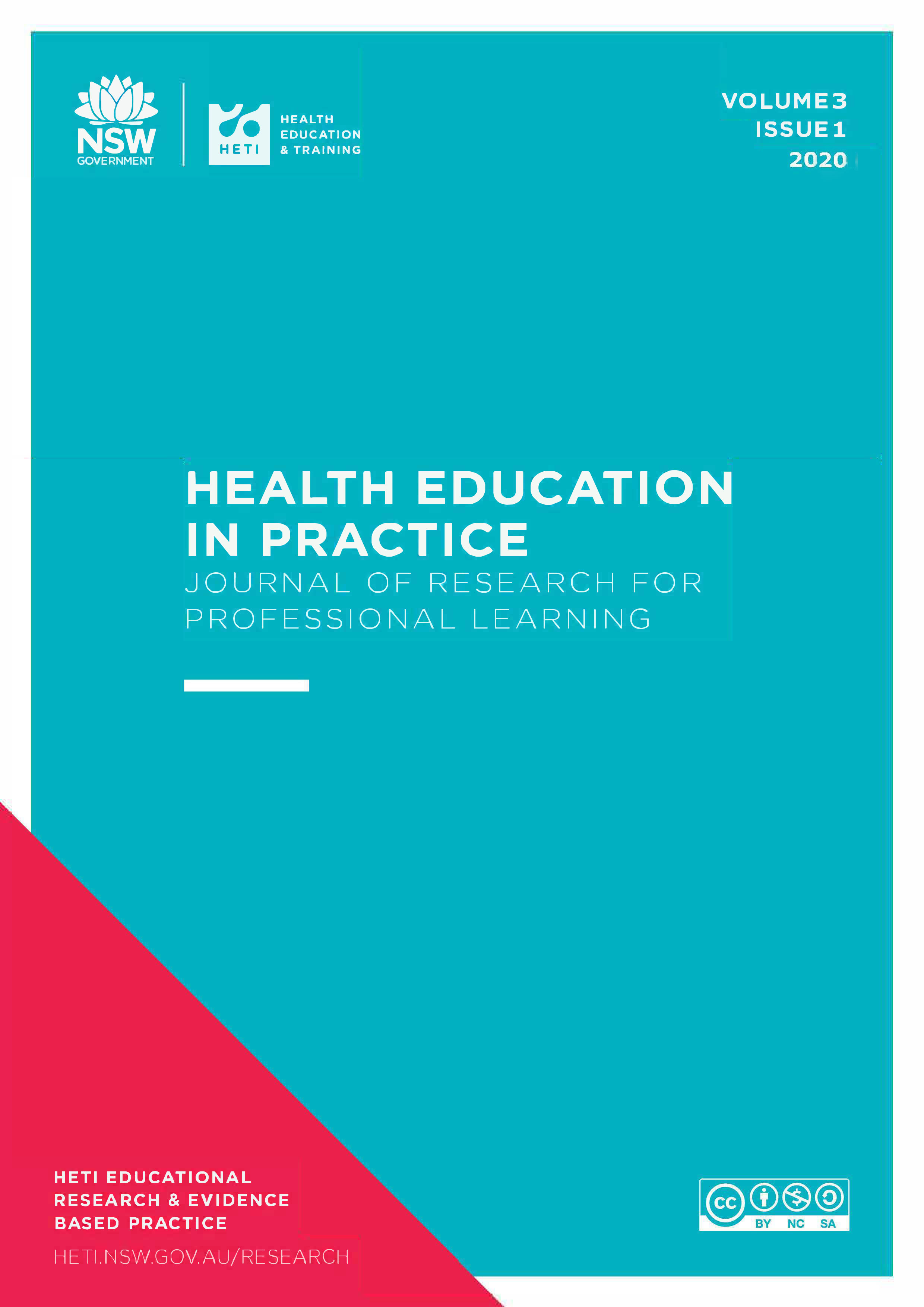Study Protocol: MASK-ED™ (KRS Simulation) - impact on physiotherapy student performance
DOI:
https://doi.org/10.33966/hepj.3.1.14276Abstract
Purpose: MASK-ED™ (KRS Simulation) involves an educator donning a silicone mask to portray a patient character that has been specifically developed in line with learning outcomes. The effectiveness of MASK-ED™ (KRS Simulation to prepare physiotherapy students prior to commencing work integrated learning has not been investigated.
Methodology: This randomised cluster trial will investigate MASK-ED™ (KRS Simulation) in addition to usual teaching in neurological physiotherapy. Physiotherapy students in an intervention group will receive simulated learning via a MASK-ED™ (KRS Simulation) character as well as usual teaching. Students in a control group will receive usual teaching only, including role-play with peers. Consent will be concealed from the investigating team and blinded assessors will assess the primary outcome. Secondary outcomes will be practical and written examination results and a satisfaction survey.
Research implications: This will be the first randomised trial investigating MASK-ED™ (KRS Simulation)’s effect on students’ readiness for work integrated learning.
Practical implications: The results from this study will inform physiotherapy education and curriculum development by increasing the evidence base for the use of simulation in training physiotherapy students prior to work integrated learning.
Originality: MASK-ED™ (KRS Simulation) was developed in nursing education at Central Queensland University, Australia. Although it has been investigated in medical imaging, this is its first practical application within physiotherapy curricula.
Limitations: It will be impractical and unfeasible to blind the participants and the investigators to tutorial group allocation and impractical for blind assessing of practical examinations.
Downloads
References
Alinier, G, Hunt, WB & Gordon, R 2004, 'Determining the value of simulation in nurse education: study design and initial results', Nurse Education in Practice, vol. 4, no. 3, pp. 200–7.
Blackstock, FC, Watson, KM, Morris, NR, Jones, A, Wright, A, McMeeken, JM, Rivett, DA, O'Connor, V, Peterson, RF, Haines, TP, Watson, G & Jull, GA 2013, 'Simulation can contribute a part of cardiorespiratory physiotherapy clinical education: two randomized trials', Simulation in Healthcare, vol. 8, no. 1, pp. 32–42.
Central Queensland University 2019, MASK-ED Workshop Information, viewed 14 September 2019, <https://www.cqu.edu.au/about-us/structure/schools/nm/simulation/mask-ed/workshop>.
Chan, A-W, Tetzlaff, JM, Gøtzsche, PC, Altman, DG, Mann, H, Berlin, JA, Dickersin, K, Hróbjartsson, A, Schulz, KF, Parulekar, WR, Krleža-Jerić, K, Laupacis, A & Moher, D 2013, 'SPIRIT 2013 explanation and elaboration: guidance for protocols of clinical trials', British Medical Journal, vol. 346, p. e7586.
Dalton, M, Davidson, M & Keating, J 2011, 'The Assessment of Physiotherapy Practice (APP) is a valid measure of professional competence of physiotherapy students: a cross-sectional study with Rasch analysis', Journal of Physiotherapy, vol. 57, no. 4, pp. 239-46.
Dalton, M, Davidson, M & Keating, JL 2012, 'The assessment of physiotherapy practice (APP) is a reliable measure of professional competence of physiotherapy students: a reliability study', Journal of Physiotherapy, vol. 58, no. 1, pp. 49-56.
Fanning, RM & Gaba, DM 2007, 'The Role of Debriefing in Simulation-Based Learning', Simulation in Healthcare, vol. 2, no. 2, pp. 115-25.
Gorman, SL, Lazaro, R, Fairchild, J & Kennedy, B 2010, 'Development and implementation of an Objective Structured Clinical Examination (OSCE) in neuromuscular physical therapy', Journal of Physical Therapy Education, vol. 24, no. 3, pp. 62–8.
Judd, BK, Alison, JA, Waters, D & Gordon, CJ 2016, 'Comparison of psychophysiological stress in physiotherapy students undertaking simulation and hospital-based clinical education', Simulation in Healthcare, vol. 11, no. 4, pp. 271–7.
Kable, AK, Arthur, C, Levett-Jones, T & Reid-Searl, K 2013, 'Student evaluation of simulation in undergraduate nursing programs in Australia using quality indicators', Nursing & Health Sciences, vol. 15, no. 2, pp. 235–43.
McAllister, M, Searl, KR & Davis, S 2013, 'Who is that masked educator? Deconstructing the teaching and learning processes of an innovative humanistic simulation technique', Nurse Education Today, vol. 33, no. 12, pp. 1453–8.
Panzarella, KJ & Manyon, AT 2008, 'Using the integrated standardized patient examination to assess clinical competence in physical therapist students', Journal of Physical Therapy Education, vol. 22, no. 3, pp. 24–32.
Pritchard, SA, Blackstock, FC, Nestel, D & Keating, JL 2016, 'Simulated patients in physical therapy education: Systematic review and meta-analysis', Physical Therapy, vol. 96, no. 9, pp. 1342-53.
Reid-Searl, K, Happell, B, Vieth, L & Eaton, A 2012, 'High fidelity patient silicone simulation: a qualitative evaluation of nursing students' experiences', Collegian, vol. 19, no. 2, pp. 77–83.
Seropian, MA, Brown, K, Gavilanes, JS & Driggers, B 2004, 'An approach to simulation program development', Journal of Nursing Education, vol. 43, no. 4, pp. 170–4.
Watson, K, Wright, A, Morris, N, McMeeken, J, Rivett, D, Blackstock, F, Jones, A, Haines, T, O'Connor, V, Watson, G, Peterson, R & Jull, G 2012, 'Can simulation replace part of clinical time? Two parallel randomised controlled trials', Medical Education, vol. 46, no. 7, pp. 657–67.
Watson, R, Stimpson, A, Topping, A & Porock, D 2002, 'Clinical competence assessment in nursing: a systematic review of the literature', Journal of Advanced Nursing, vol. 39, no. 5, pp. 421–31.

